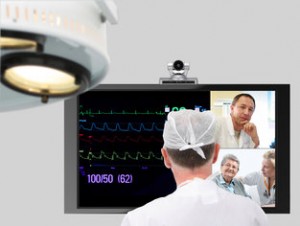 Videoconferencing service provider Vidyo, a growing presence in healthcare because it provides high-quality video with low latency and as encryption to HIPAA standards, is about to get bigger, particularly when it comes to mobile and wireless health.
Videoconferencing service provider Vidyo, a growing presence in healthcare because it provides high-quality video with low latency and as encryption to HIPAA standards, is about to get bigger, particularly when it comes to mobile and wireless health.
Hackensack, N.J.-based Vidyo is teaming up with Royal Philips Electronics to offer a communications and collaboration platform that includes remote patient monitoring, clinical decision support and numerous mobile options. Philips is contributing its existing eICU technology, while Vidyo will allow secure, high-quality communications to take place over the public Internet rather than on expensive, dedicated telemedicine connections. Vidyo also can support many simultaneous participants from multiple locations, and is compatible with legacy telemedicine equipment.
"This is about accessibility on any device and any network," Dr. Amnon Gavish, Vidyo's senior vice president of vertical solutions, tells MobiHealthNews. Philips already has some cutting-edge mobile technology, in the form of the Vital Signs Camera app for the iPad, but that is intended for "entertainment" purposes, not medical diagnoses or treatment.
The Philips-Vidyo collaboration takes mobility into the clinical realm, in part because Vidyo offers an application programming interface so partners and organizations can develop custom apps.
A telemedicine session can incorporate patient sensors so remote clinicians can be up to date on each patient's condition. Or, for example, a hospital can send patients home with monitoring technology. "You can give them an iPad for couple of weeks to manage post-op or post-discharge care," Gavish says, or patients can download an app on their own Apple iOS or Android smartphone or tablet.
Such an arrangement can help hospitals avoid preventable readmissions, an important consideration given that Medicare is no longer reimbursing for certain readmissions within 30 days of initial hospital discharge.
Vidyo already provides remote videoconferencing technology to telehealth service provider American Well and to several large telemedicine networks abroad. Gavish notes that the Royal Flying Doctors Service of Australia, which serves remote areas of that vast, sparsely populated country, has started using Vidyo to care for far-flung patients. The service saves about $10,000 each time it can provide a virtual consultation rather than having to dispatch a medical crew by air, Gavish says.














